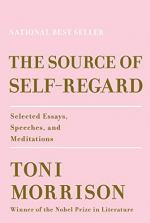
|
| Name: _________________________ | Period: ___________________ |
This quiz consists of 5 multiple choice and 5 short answer questions through Section 7: Part II--God’s Language, including the essays “The Trouble with Paradise” through “Faulkner and Woman”.
Multiple Choice Questions
1. In "The Habit of Art," Morrison tells the anecdote about Antigone in Haiti to illustrate what point?
(a) Acting in a play is therapeutic.
(b) Dictators try to crush artistic expression.
(c) Ancient Greek works are still relevant today.
(d) Art has real-world power.
2. In "The Writer Before the Page," Morrison explains what about the structure of her novels?
(a) She always begins with a careful outline.
(b) She finds chapter and part designations unhelpful.
(c) She dislikes nonlinear narrative.
(d) She is frustrated when the parts feel fragmentary.
3. In "Academic Whispers," Morrison compares African American literature to what?
(a) A "houseboy," ushering guests into a party he is not invited to.
(b) A "field hand" tending crops he does not own.
(c) A child who has been locked out of his own house.
(d) A horse pulling a carriage for its wealthy master.
4. In "Tribute to Martin Luther King Jr.," what does Morrison say she wonders about MLK?
(a) Where he found his courage.
(b) Whether he would be satisfied with the progress Americans have made.
(c) Whether he would be disappointed in her.
(d) How he preserved his sense of hope.
5. To whom does Morrison address her remarks about the dead of September 11, 2001?
(a) To the dead themselves.
(b) To all Americans.
(c) To the terrorists responsible for the deaths.
(d) To the families of the dead.
Short Answer Questions
1. In "Literature and Public Life," Morrison opens by joking that because she was once a student at the place she is now speaking, what might happen after her speech?
2. Why is "panoply" a clever piece of diction as used in "Unspeakable Things Unspoken"?
3. According to Morrison, globalism creates a fear of what?
4. In "Unspeakable Things Unspoken," Morrison comments that race was once used to exclude Blacks, but now that they want their race represented, they are told it does not exist. What function does this detail perform?
5. What is one of the consequences that Morrison blames on minstrelsy?
|
This section contains 465 words (approx. 2 pages at 300 words per page) |

|




